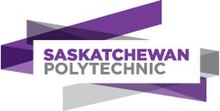This article needs additional citations for verification. (August 2012) |
Saskatchewan Polytechnic (formerly the Saskatchewan Institute of Applied Science and Technology or SIAST /ˈsaɪ.æst/) is Saskatchewan's primary public post-secondary institution for technical education and skills training, recognized nationally and internationally for its expertise and innovation. Through program and course registrations, Saskatchewan Polytechnic serves 26,000 distinct students with programs that touch every sector of the economy. It operates campuses in Moose Jaw, Prince Albert, Regina and Saskatoon; and provides a number of courses and programs through distance education.
 | |
| Motto | Tomorrow in the making |
|---|---|
| Type | Polytechnic institution |
| Established | 1959 |
| President | Larry S. Rosia |
Administrative staff | 2700 |
| Students | 14,176 full load equivalent (2018) Saskatoon campus: 7,956; Regina campus: 4,444; Moose Jaw campus: 3,192; Prince Albert campus: 2,883[1] |
| Address | 52°07′42″N 106°39′37″W / 52.12833°N 106.66028°W |
| Campus | Saskatoon Moose Jaw Regina Prince Albert |
| Colours | Purple and grey |
| Affiliations | CCAA, ACCC, AUCC, CIS, CWUAA, CBIE, CUP. |
| Website | www |
Saskatchewan Polytechnic maintains reciprocal arrangements with partner institutions, including: Dumont Technical Institute, First Nations University of Canada, Saskatchewan Indian Institute of Technologies, University of Regina, and the University of Saskatchewan.
Programs
editSaskatchewan Polytechnic offers over 150 programs in applied/visual media, aviation, basic education, business, community/human services, engineering technology, health services, hospitality/food services, industrial/trades, natural resources, nursing, technology, recreation and tourism, and science. In addition, Saskatchewan Polytechnic provides training to apprentices in several trades.
Campus
editSaskatchewan Polytechnic comprises four campuses in Saskatchewan:
- Located at Idylwyld Drive North and 33rd Street East (southeast corner) in Saskatoon, the campus is named for Henry Kelsey, a famous fur trader and explorer. The institute in Saskatoon dates back to 1941 when The Canadian Vocational Training School was established to train veterans returning from the war.[3] The campus contains over 13 acres (5.3 ha) of instructional floor space.[3]
History
editThe four schools that make up Saskatchewan Polytechnic started off as four individual schools. The Moose Jaw campus started off as the Saskatchewan Technical Institute in 1959. Saskatoon began as the Central Saskatchewan Technical Institute in 1963. Regina began as the Saskatchewan Institute of Applied Arts and Sciences in 1972. Prince Albert began as the Northern Institute of Technology in 1986. On January 1, 1988, The Institute Act and the Regional Colleges Act amalgamated Saskatchewan's technical institutes, urban community colleges and the Advanced Technology Training Centre to form the Saskatchewan Institute of Applied Science and Technology (SIAST).[7] The institution was named Saskatchewan Polytechnic on September 24, 2014.[7][8]
Scholarships
editSaskatchewan Polytechnic joined Project Hero, a scholarship program cofounded by General (Ret'd) Rick Hillier, for the families of fallen Canadian Forces members.[9]
See also
editReferences
edit- ^ "Saskatchewan Polytechnic quick facts". Saskatchewan Polytechnic. Retrieved April 11, 2019.
- ^ "Saskatoon Campuses". Saskatchewan Polytechnic. Saskatchewan Polytechnic. Retrieved 18 August 2023.
- ^ a b "SIAST Kelsey Campus (Saskatoon)". Saskatchewan Institute of Applied Science and Technology. Archived from the original on July 11, 2011.
- ^ "Moose Jaw Camus". Saskatchewan Polytechnic. Saskatchewan Polytechnic. Retrieved 18 August 2023.
- ^ "Regina Campuses". Saskatchewan Polytechnic. Saskatchewan Polytechnic. Retrieved 18 August 2023.
- ^ "Prince Albert Campuses". Saskatchewan Polytechnic. Saskatchewan Polytechnic. Retrieved 18 August 2023.
- ^ a b "A proud history and prosperous future". Saskatchewan Polytechnic. Retrieved 18 August 2023.
- ^ "SIAST re-launches as Saskatchewan Polytechnic". CBC News. Retrieved 2014-09-24.
- ^ "Programs and Services - Canadian Forces (CF) College Opportunities Programme". Archived from the original on 2010-01-13. Retrieved 2011-02-20. Project Hero[permanent dead link]